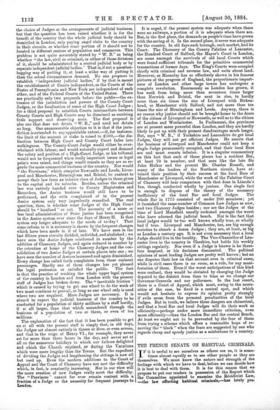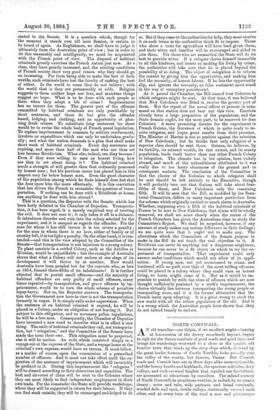THE FRENCH SENATE ON HABITUAL CRIMINALS.
IF it is useful to see ourselves as others see us, it is some- times almost equally so to see other people as they see themselves. We must know the nature and strength of the feelings with which we have to deal, before we can decide how it is best to deal with them. It is for this reason that we propose to put our readers in possession of the Report which the Committee appointed to examine the Recidivist Law, —the law affecting habitual criminals,—has lately pre-
sented to the Senate. It is a question which, though for the moment it stands over till next Session, is certain to be heard of again. As Englishmen, we shall have to judge it ultimately from the Australian point of view ; bat in order to do this reasonably and intelligently, we must be acquainted with the French point of view. The disposal of habitual criminals greatly exercises the French nation just now. As a class, they have greatly increased, and the existing conditions of French society show very good reason why they should go on increasing. Far from being able to make the best of both worlds, such criminals have lost the faculty of making the best of either. In the world to come they do not believe • with the world that is they are permanently at odds. Religion suggests to them neither hope nor fear, and mundane things suggest no hope. What is to be done with such people as these when they adopt a life of crime ? Imprisonment has no terrors for them. The greater part of the offences committed by habitual criminals are only punishable by short sentences, and these do but give the offender board, lodging, and clothing, and an opportunity of plan- ning fresh crimes. To substitute long sentences for short would be to revise the whole body of French penal legislation. To replace imprisonment in common by solitary confinement, involves an expenditure which can only be undertaken gradu- ally ; and what the nation demands is a plan that shall make short work of habitual criminals. Every day sentences are expiring, and more than half of the men who are thus set free become Recidivists. What else, indeed, can they become ? Even if they were willing to earn an honest living, how are they to set about doing it I The habitual criminal needs a strength of will greater than that ordinarily possessed by honest men ; but his previous career has placed him in this respect very far below honest men. Even the good character of the population among which he finds himself does but shut the door upon him the more effectually. It is this conviction that has driven the French to reconsider the question of trans- portation. If nothing can be done with a Recidivist at home, can anything be done with him abroad ?
This is a question, the Reporter tells the Senate, which has been hotly debated in the Chamber of Deputies. Transporta- tion, it has been urged, is a merely empirical way of treating the evil. It does not cure it ; it only takes it off to a distance. It introduces disorder and ruin into the colony selected for the experiment, and it is unequal as regards the offender. For the man for whom it has still terrors it is too severe a penalty ; for-the man in whom there is no love, either of family or of country left, it is too light a penalty. On the other hand, it is con- tended—and this is the view adopted by the Committee of the Senate—that transportation is not injurious to a young colony. To plant convicts in a settled Colony, such as the Antilles or Reunion, would be unjustifiable ; but the example of Australia shows that what a Colony will not endure at one stage of its development it will thrive by at another. How would Australia have been peopled but for the convicts who, as late as 1854, "formed three-fifths of its inhabitants ? It is further objected that to punish small offences—and the majority of habitual offenders are only guilty of small offences, many times repeated—by transportation, and grave offences by im- prisonment, would be to turn the whole scheme of penalties topsy-turvy. Not so, the Reporter answers. The transporta- tion the Government now have in view is not the transportation formerly in vogue. It is simply exile under supervision. When the sentence of an habitual criminal is expired, he will be placed in a Colony, under an obligation of not leaving it. But subject to this obligation, and to necessary police regulations, he will be a free man. Consequently, the Chamber of Deputies have invented a new word to describe what is in effect a new thing. The exile of habitual criminals they call, not transporta- tion, but " relegation," and the Committee of the Senate have made the term their own. This relegation must be perpetual, else it will be useless. An exile which consisted simply in a voyage out at the expense of the State, and a voyage home at the criminal's own expense, would have no terrors. It must follow, as a matter of course, upon the commission of a prescribed number of offences. And it must not take effect until the ex- piration of the sentence of imprisonment which will invariably be prefixed to it. During this, imprisonmentthe " relegates ' will be classed according to their characters and capacities. The best and cleverest of them will be sent to the Colonies where they are most likely to find independent employment in their own trade. For the remainder the State will provide workshops, where they will be supported in return for their labour. If they can find work outside, they will be encouraged and helped to do so. But if they come to the authorities for help, they must receive it on such terms as the authorities think fit to impose. Those who show a taste for agriculture will have land given them, and their wives and families will be encouraged and aided to join them. For those who are unmarried the State will do its best to provide wives. If a relegate shows himself insensible to all this kindness, and insists on making his living by crime, the authorities will take care that he is placed beyond the possibility of so doing. The object of relegation is to reform the convict by giving him the opportunity, and making him feel the necessity, of honest labour. If he lets the opportunity slip, and ignores the necessity, no false sentiment must stand in the way of exemplary punishment. As it passed the Chamber, the Bill named four Colonies to which relegates might be sent. At that time, it was believed that New Caledonia was litted to receive the greater part of them. But the report of the naval officer at present in com- mand on that station does not bear out this view. Convicts already form a large proportion of the population, and the State domain ought, for the most part, to be reserved for free Colonists. A more promising theatre for the experiment is French Guiana, the Governor of which is quite ready to re- ceive relegates, and hopes great results from their presence. The Minister of Marine is not so positive against the selection of New Caledonia ; but he thinks that only relegates of a superior class should be sent there. Guiana, he believes, by its fertility, its mineral wealth, its vast extent, and its scanty population, lends itself better than any other French Colony to relegation. The climate has, in his opinion, been unduly abused, and much of the unhealthiness attributed to it was really due to too hasty clearances of the ground and to consequent malaria. The conclusion of the Committee is that the choice of the Colonies to which relegates shall be sent should be left entirely to the Executive, though it will probably turn out that Guiana will take about four- fifths of them, and New Caledonia only the remaining fifth. It will be seen that the Bill, as modified by the: Sena- torial Committee, differs in many important particulars from the scheme which originally excited so much alarm in Australia. Whether, supposing even a fifth of the habitual criminals of France to be sent to New Caledonia, that alarm will be wholly removed, we shall see more clearly when the recess of the French Chambers has given the Australians time to study the Committee's Report. We shall be surprised, however, if any amount of study makes any serious difference in their feelings ; we are quite sure that it ought not to make any. The alterations which the Committee of the Senate propose to make in the Bill do not touch the real objection to it. A Recidivist can never be anything but a dangerous neighbour, because he can never be a fit object on which to try the ex- periment of transportation. That experiment could only answer under conditions which would not allow of its appli- cation. If young men, not yet accustomed to crime, and burdened with no guilt save that of the most trifling offences, could be placed in a colony where they could earn an honest living, no harm might come of it. But as it would be im- possible to punish by exile the class of offences which are now thought sufficiently punished by a week's imprisonment, the choice virtually lies between transporting the wrong people or transporting none, and it is the former alternative that the French insist upon adopting. It is a great wrong to stock the new world with all the refuse population of the old. And it is a wrong which the Australian people have shown that they do not intend tamely to endure.



































 Previous page
Previous page